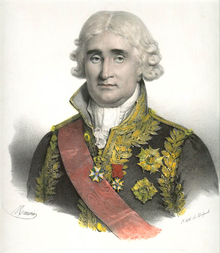Cambacérès
Prince Jean Jacques Cambacérès
Mental characteristics
Personal history
In his early life he was influentail in the Coart of Versailles and was Turned there.
During the French revolution he used the opertunity to adjust his age and avoid the gillotine gaining power within the Revolution as an added benefit.
Cambacérès was a member of the Committee of General Defence from 1793 until the end of 1794, and later became a member of its infamous successor, the Committee of Public Safety after the fall of Robespierre.
During 1795, he was employed as a diplomat and negotiated peace with Spain, Tuscany, Prussia and the Netherlands. His remarkable debating skills gave him a spot as a councilor of the Five Hundred from 1795-1799.
Cambacérès was considered too conservative to be one of the five Directors who took power in the coup of 1795 and, finding himself in opposition to the Executive Directory, he retired from politics. In 1799, however, as the Revolution entered a more moderate phase, he became Minister of Justice. He supported the coup of 18 Brumaire (in November 1799) that brought Napoleon Bonaparte to power as First Consul, a new regime designed to establish a stable constitutional republic.
In December 1799, Cambacérès was appointed Second Consul under Bonaparte. He owed this appointment to his vast legal knowledge and his reputation as a moderate republican. His most important work during this period, and arguably during his entire political career, was the drawing up of a new Civil Law Code (later called the Napoleonic Code; France's first modern legal code). The Code was promulgated by Bonaparte (as Emperor Napoleon) in 1804. In the end, the Napoleonic Code was the work of Cambacérès and a commission of four lawyers.
The Code was a revised form of Roman law, with some modifications drawn from the laws of the Franks still current in northern France (Coutume de Paris). The Code was later extended by Napoleon's conquests to Poland, Italy, the Netherlands, Belgium, western Germany and Spain, and indirectly to the Spanish colonies in Latin America. Cambacérès' work has thus been enormously influential in European and American legal history. Versions of the Code are still in force in Quebec and Louisiana.
The Napoleonic Code dealt with Civil Law; other codes ensued for Penal Law, criminal procedure, and civil procedure.
Cambacérès disapproved of Bonaparte's accumulation of power into his own hands (culminating in the proclamation of the First French Empire on 18 May 1804) but retained high office under Napoleon: Arch-Chancellor of the Empire and President of the House of Peers from 2 June, to 7 July 1815. He also became a prince of the Empire and in 1808 was made Duke of Parma. His duchy was one of the twenty created as a duché grand-fief a rare hereditary honor. He was essentially second in command of France during the Napoleonic era.
Under Napoleon, he was a force for moderation and reason, opposing adventures such as the Spanish affairs in 1808 and the invasion of Russia in 1812. Nevertheless, Cambacérès was extremely trusted by Napoleon and was constantly consulted for advice; Cambacérès even sat as Council of State when Bonaparte was involved in other affairs. As Napoleon became increasingly obsessed with military affairs, Cambacérès became the de facto domestic head of government of France, a position which inevitably made him increasingly unpopular as France's economic situation grew worse. As more and more of Napoleon's ministers proved themselves untrustworthy, Cambacérès' power continued to grow. His taste for high living also attracted hostile comments. Nevertheless, he was given credit for the justice and moderation of his government, although the enforcement of conscription was increasingly resented towards the end of the Napoleonic Wars.
When the Empire fell in 1814, Cambacérès retired to private life but was later called upon during Napoléon's brief return to power in 1815. During the Hundred Days, the short period of time when Napoleon returned from exile, Cambacérès served as the minister of justice. After the restoration of the monarchy, he was in danger of arrest for his revolutionary activities, and he was exiled from France in 1816.
Shortly after his exile he faked his death and moved to Çanakkale were he attached himself to the reigning Prince.
Sexuality
Homosexual.
Education
He graduated in law from the college d'Aix and succeeded his father (who later became mayor of Montepellier) as Councillor in the court of accounts and finances in Toulouse.
Personality Characteristics
Vices & Personality flaws
In life he had a fondness for fine food, drink and attrative young men. In death that has transfomed into an interest in the differant flavours of blood. He maintains that the blood of a virgin Prince is the finest one can sample.
Social
Contacts & Relations
Ally to Seraphima
Religious Views
Athiest

Species
Ethnicity
Currently Held Titles
Year of Birth
1705 AD
195 Years old
Circumstances of Birth
Cambacérès was born in Montpellier, into a poor family of the legal nobility.
Birthplace
Montpellier, France
Children
Current Residence
Other Affiliations
Ruled Locations









Comments